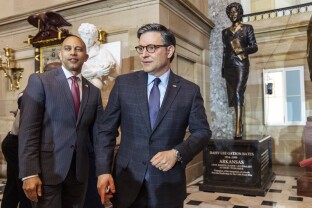On Thursday, Democrats insisted they were sticking to a bipartisan spending deal struck with Republicans earlier this week. By Friday morning, just hours ahead of a government shutdown, Democrats had dramatically changed their tune.
Instead of the all-or-nothing line Minority Leader Hakeem Jeffries and his flock repeated time and again Thursday, Democrats were now saying they were open to negotiations to keep the government funded over the holidays. And given a new strategy from Speaker Mike Johnson, where Republicans would divide parts of the CR and let the House vote them up or down, Congress could very well avert a shutdown that looked almost inevitable just hours ago.
Asked if Democrats were open to compromise, Rep. Don Beyer was definitive. “Absolutely,” he told NOTUS. “We’ve always been. I mean, the word that Hakeem uses again and again is, ‘reasonable.’”
“Compromise is possible,” Rep. Mike Quigley told reporters.
As Democrats left a closed-door meeting Friday morning, the contours of a compromise spending package were still murky. But House Democrats said Jeffries had just told them that lines of communication with GOP leaders were “open,” though Jeffries didn’t get into specifics on any negotiations and maintained that the “best path forward” remained the bipartisan agreement.
That has been the consistent message since Wednesday, when Johnson and Republicans pulled the original deal after Donald Trump and Elon Musk spoke out. But it’s also one not getting Congress any closer to funding the government.
When Johnson proposed an alternate “deal” on Thursday — one crafted with Trumpworld that included a two-year debt ceiling hike — Democrats told reporters they weren’t just a “no” but a “hell no.” All but three Democrats ultimately voted against the bill on the floor Thursday evening.
But on Friday, Democrats appeared less willing to stand by those hardball tactics, repeatedly telling reporters they wanted to work across the aisle to avert a shutdown.
“In the short term, we just need to keep the government open and do our business,” Rep. Adam Smith told NOTUS.
Rep. Judy Chu told NOTUS that Jeffries told Democrats that “whatever it is that they propose, he will bring back to the caucus.”
“We need a discussion,” she said.
Rep. Sydney Kamlager-Dove told NOTUS that Democrats have always wanted to keep the government open, but “we’re not going to get punked, and we’re not going to carry anybody else’s water” to get it done.
“The only person who can negotiate is Jeffries,” Kamlager-Dove said. “I will tell you one thing I have learned is that Hakeem Jeffries always has a plan.”
For the GOP’s part, sources told NOTUS that Republicans plan to bring three separate bills to the floor: A clean government funding extension until March 14, $110 billion in disaster aid and separate relief for farmers with a one-year farm bill extension. If all three pass, the priorities would likely be repackaged together for Senate approval.
The plan excludes a debt ceiling extension, though that could always change. Republicans are slated to meet to discuss the plan on Friday, and the Rules Committee may consider the proposal early in the afternoon.
Jeffries told reporters around 11 a.m. that Republicans had not floated the specifics of that plan to Democratic leadership.
“It’s not an idea that has been sent to anyone in the Democratic caucus, myself included. It’s not an idea that’s been presented to me, so I can’t comment on a plan when there’s no plan in front of me to evaluate,” he said.
Still, at least one Democrat said he was open to considering the proposal. “We just have to see it,” Beyer said. “Maybe it’s a good idea.”
Without Democratic support, however, the House passing any stopgap spending plan in time to avoid a shutdown might be impossible. Several Republicans in the GOP conference have consistently voted against continuing resolutions on principle, meaning that at least some Democratic votes will be necessary.
And Democrats are keenly aware of that fact.
“Nothing on a budgetary basis is going to pass here without the Democrats,” Rep. Jared Moskowitz said.
—
Riley Rogerson is a reporter at NOTUS.
Violet Jira, Casey Murray and Katherine Swartz are NOTUS reporters and Allbritton Journalism Institute fellows.
Reese Gorman, who is a reporter at NOTUS, contributed to this report.
Sign in
Log into your free account with your email. Don’t have one?
Check your email for a one-time code.
We sent a 4-digit code to . Enter the pin to confirm your account.
New code will be available in 1:00
Let’s try this again.
We encountered an error with the passcode sent to . Please reenter your email.


